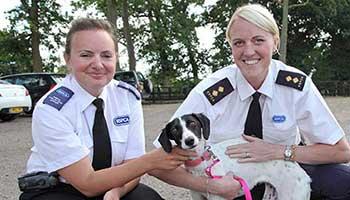38 Italian greyhounds rescued by the RSPCA from breeder in Middlesbrough - RSPCA
38 Italian greyhounds rescued by the RSPCA from breeder in Middlesbrough
05.07.24
A breeder who kept 38 dogs and puppies in faeces-smeared pens and crates, has been banned from keeping animals for ten years.
The dogs ranged in age from three to 14 weeks, were living in nine wire pens on urine-soaked bedding with no food or toys, and only one of the enclosures had water available. All of the breeding females had severe dental disease, one had a broken front leg, and six of the 19 puppies were malnourished.
Daniel Simpson has now been disqualified from keeping animals for ten years after admitting five offences contrary to the Animal Welfare Act 2006 - including one of breeding dogs without a licence - following an investigation and prosecution by the RSPCA.
At a sentencing hearing at Teesside Magistrates Court on 21 June, magistrates heard how the dogs were removed from the property on 12 September last year because of concerns for their welfare.
In her written evidence to the court, RSPCA Inspector Clare Wilson, one of three officers from the charity who took part in the incident, said: "I went through to the conservatory and found dogs and puppies in crates around the edges of the room. There were also dog pens in the garage outside containing more dogs and puppies, and there was a strong smell of ammonia in these areas. I counted 38 dogs and puppies, which were all Italian greyhounds."
"The small crates in the conservatory and the pens and small crate in the garage were all against the walls and most were next to each other. They were all dirty and smelly and had faeces smeared over the bases. Only one pen of nine puppies in the garage had any water available. The other eight pens had no water and some didn't have any bowls in them at all.
"There was no food or any toys available in any of the pens for the dogs or puppies. The bedding was dirty and soaked in urine and not every enclosure had bedding. I saw the dogs eating their poo and fighting amongst themselves in the crates.
"Many of them appeared underweight and I was particularly concerned about one of the smaller puppies who seemed very lethargic. One dog had a broken and hanging right foreleg."
A vet was called to come out and look at the dogs and she confirmed they were likely to suffer if their circumstances didn't change and they were all taken into possession by the police.
In written evidence to the court, the same vet who later examined them said that six of the puppies - who were given body condition scores of 1/6 - had been suffering for at least two weeks because of an inadequate diet. Five adult females had been caused to suffer ‘for at least months,' because of advanced dental disease which Simpson had failed to seek veterinary treatment for, while Daisy had been caused unnecessary suffering for at least three days because of an untreated broken leg.
The vet concluded that Simpson had failed to meet the needs of all 38 greyhounds by failing to provide them with a suitable environment, diet, the ability to express normal patterns of behaviour and the need to be housed with, or apart from, other animals.
The dogs were all signed over into the care of the RSPCA by Simpson during the investigation, and the charity paid for their treatment and neutering. Most of them were cared for and rehomed at four RSPCA branch centres - York, Harrogate and District, Chesterfield and North Derbyshire, Derby and Southport, Ormskirk & District and two were fostered by veterinary staff before being adopted.
Simpson will not be able to contest his disqualification order - which also includes dealing and transporting animals - for six years. He was also given an 18-month community order with a 12-month alcohol treatment requirement and 25 RAR days and told to pay costs of £990 and a victim surcharge of £114.
In mitigation, the court was told that he was ashamed and embarrassed about what had happened and needed help for a drinking problem. He was said to have been previously licensed as a ‘four-star' establishment to breed French Bulldogs but that had ended following the breakdown of a previous relationship.
Speaking after the case Inspector Wilson said: "The enclosures and conditions these greyhounds were kept in fell far short of the legal standards for a licenced breeding establishment. It was a large number of animals to rehabilitate and care for, but thanks to our network of branch centres and the help of fosterers we were able to quickly rehome them all, and it's fantastic to see the dogs looking so happy with their new families.
"Of course, we would always encourage anyone thinking of welcoming a dog into their family to consider rescuing one as we have hundreds of all shapes and sizes waiting to be adopted at our animal centres up and down the country.
"For people who are considering getting a puppy from a breeder, we would urge them to do their homework, visit the puppy with their mum and siblings in the place where they were born and raised, and use the puppy contract to ensure they are getting a happy, healthy pet and not supporting people who put profit before welfare.”


